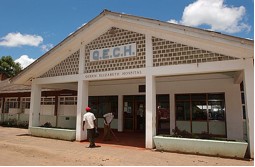Queen Elizabeth Central Hopsital (QECH) has been recording 30,000 cases of typhoid fever every month since January this year the hospital confirmed.
“The hospital has been receiving an increasing number of typhoid fever suspects mostly children since last year,” said Qech Hospital Director Dr Andrew Gonani in a written response to a questionnaire.
Gonani added that most of them have a confirmed diagnosis of the disease as detected by the blood culture based surveillance that the hospital conducts among adults and children inpatients.
He said typhoid is a communicable disease that is spread by either eating contaminated food or drinking contaminated water, meaning that patiens might have interacted with an environment where there is a breakdown in hygiene and sanitation.
“The cornerstone for preventing communicable disease like typhoid, diarrhea diseases including cholera is to improve one’s hygiene through hand washing after visiting the toilet and before any meal, treating water from unprotected sources with chlorine and using toilets among others,” he said.
According to Gonani, much as many cases might be from Blantyre, the hospital receives patients from all over southern region. Qech sees 150,000 children as outpatients and about 30,000 children as admitted patients every year.
The common causes of diseases at the hospital, apart from typhoid include severe malaria, gastro-intestinal diseases and sepsis among others. The World Health Organisation (WHO) says typhoid is a bacterial disease caused by salmonella typhi which is transmitted through ingestion of food or drink contaminated by faeces or urine of infected people.
Symptoms develop one to three weeks after exposure and may be mild or severe. They include high fever, headache, constipation or diarrhea, rose-coloured spots on the chest and enlarged spleen and liver,” reads the information sourced from WHO website.
The information further says the disease can be treated with antibiotics but resistance to common antimicrobials is widespread – Mana





No comments! Be the first commenter?